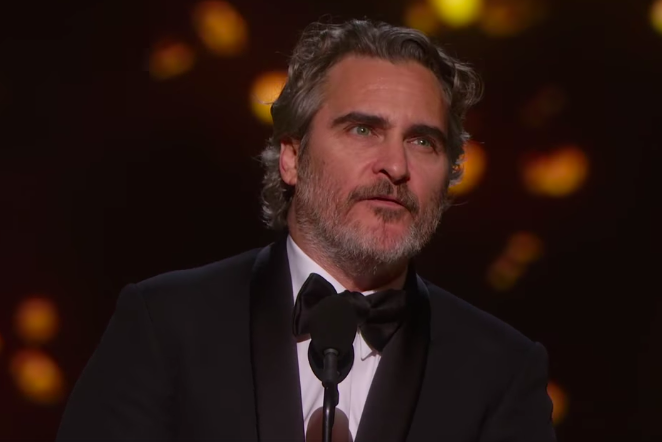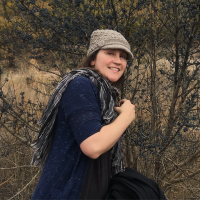Read the article that inspired this response here.
~
“It does not matter how slowly you go, so long as you don’t stop.” ~ Confucius
~
Like many of you probably did, I watched the speech Joaquin Phoenix gave after winning the best actor award at this year’s Oscars.
Like many of you may have, I felt a subtle punch to the gut while I watched it.
Mr. Phoenix took advantage of his moment at the podium to issue a heartfelt call to action. He implored listeners to consider the mess we’ve made of our planet, and then consider the role we might have in co-creating a solution together. He called us to look clearly at our dysfunction, then turn the high beams of our creativity toward easing the great sufferings of our world.
As I watched the awardee speak, his face red and hands tentative with emotion, my heart softened. My soul empathized with his. His effort to choke back tears from his eyes sent tears welling up in mine. Such sensitive words, such compassionate intention. So rare to witness under a spotlight.
As Phoenix turned to leave the stage, his heart in his hands, I felt a knock inside my own heart. Inside, I cheered for him. I thought, “Thank God he is speaking brave things that need to be said, in a moment when so many people can hear.”
Right then, that knock to my heart touched a nerve in me, surged upward to my intellect, and made me think a disturbing question:
Why am I not also speaking?
For many years in my life, I did speak. I spoke loudly in support of the causes I believed in, the struggles that kept me up at night. The logging of the redwood trees in the Pacific Northwest. The devastation of our sacred rivers through dam construction and mining. Destruction of wildlife and wild lands at the hands of those who take and do not give back.
What disturbed me most in Phoenix’s speech was his spotlight on the suffering of farm animals. As he spoke about a mother dairy cow, wailing with fear as her calf is torn away so she can produce more milk, I knew the story too well. We humans will buy her milk in a sterile carton, far away from its source, and swirl it into our coffee (while, presumably, shipping her calf to a veal farm), with no sense of connection to her pain.
The suffering of animals always pulled me to the frontlines of activism like no other issue. I marched in protest on city streets against lab animal experiments. I stood on corners collecting petition signatures to ban steel leghold traps. I wrote to politicians, imploring them to pass legislation to make captive whales and dolphins illegal.
When I was in veterinary school, I reported my school to PETA for capturing pigeons at the zoo to use for euthanasia experiments. I also reported the zoo.
I did everything I could to live according to my highest values: compassion and respect for all beings. I was far from perfect, but I was never quiet.
I was young then, in my teens and 20s. I used to wonder why everyone around me on the street also seemed so young. I wondered why it seemed that the older people got, the less they came out to participate in our shared efforts. Not everyone moved on, but most did.
I was saddened by this. We needed those people and their voices, I thought. We needed them to stay.
So I became quite interested to know what happened. Had those people simply stopped caring as they grew older? Surely not. Had their lives just become too busy with family and other responsibilities that pulled them away? Maybe. Did they just get cynical, after fighting for so long and seeing only slow, meandering progress over time? Quite possible, I thought.
Now that I’m a generation past that time, and realize that I’ve become one of those people not speaking so loudly as I once did, I have a different theory:
I think activists just get tired.
The life of an activist can be exhausting. We can care so deeply about an issue that our care builds to a raging fire in our bones. Standing on the frontlines of continued heartbreak exposes us to intense emotional heat. It can truly drain the spirit to see the news, read the stories, and witness the dire outcomes of humanity’s destructive impulses, year after year, decade after decade.
A story I love:
Back in 1846, the writer Henry David Thoreau was thrown in jail in Concord, Massachusetts. He had refused to pay his taxes, in protest of both slavery and the Mexican-American war. Refusal to pay was, for Thoreau, a refusal to support a government he saw as inhumane and barbaric.
As he famously tells it, Thoreau was visited in jail by his friend, the poet and naturalist Ralph Waldo Emerson. Upon arriving, Emerson looked in on Thoreau with an air of exasperation, and asked, “David, what are you doing in there?”
Thoreau looked him in the eye defiantly and answered, “Waldo, the question is what are you doing out there?”
I have always loved this story. I identify with the wild idealist Thoreau, and his willingness, within his capacities, to stand against authority when that authority stood for something he believed was vile and wrong.
Remembering the story now, I have an eerie feeling. I step back and look at the scene, and I shudder. At this moment I don’t imagine myself sitting next to Thoreau in spirit, a friend and fellow fighter against injustice. Instead, I now have the feeling I’m looking in at him from the outside.
I ask myself, what am I doing out here?
When I was fully engaged in activism, the energy of the fight began to tear me up. I became angry. I became belligerent. In demanding respect for animals, ironically, I began to treat people in ways that were not respectful. (The time I threw French fries on a woman wearing a fur coat in a bar comes to mind. So much for respect for all beings.)
In particular, working within the animal shelter industry for years, and seeing people mistreat, abandon, abuse, and throw away animals month after month, I broke down. I was plagued by nightmares. I started to hate human beings. It got bad.
My heart was burnt to ashes, and I had to take some time away. I quit my job, and left the world of activism for a long and soul-searching break.
In time, I got my legs back under me. I learned to manage my emotions, and to separate a good person from their negative actions. I learned to see people on the other side of an issue not as enemies, but as fellow human beings with shared needs. I felt stronger, more able to empathize and connect from a place of respect and dignity, rather than anger or fear.
But I still stayed away from the activist street. Something in me was afraid to show up, afraid I might step peacefully into the arena of battle and be set immediately on fire.
These days, I have become much more tentative about what I step into. For instance, I used to watch videos and read stories incessantly about the plight of animals—about factory farming, for example, and animals like the mother cow Phoenix described. But today when I see a video link about a factory farm, I can’t even bring myself to click on it. Why?
It’s not because I don’t care. It’s not because I’m numb. On the contrary, it’s because I’ve become sensitized. Something in me is still smoldering and I’m afraid to add gas to the coals. The wound is still open.
I’m tired.
I wonder if anyone else can relate to being tired like this. I suspect that maybe Joaquin Phoenix does.
His invitation to problem solve in the midst of suffering gave me an attitude adjustment, and quickly. His call to creativity invokes not the wounded and painful in life, but the hopeful and possible. His words are a challenge to think about things differently. I did, and here’s what I found:
Creativity is bigger than being tired.
Yes, I’m tired. But I’m not nearly as tired as the mother cow crying for her calf. She needs a voice, and she needs me to be creative. There are so many ways our human ingenuity and intelligence can solve for the painful problems in our world. Solving for her would be just one of them.
I wonder, who else is tired, but creative, and willing to speak? And I wonder, if we were all to raise our colorful and creative voices together, how powerful could we be?
Thinking about this, I realize where all those activists ahead of me might have gone. Maybe they didn’t disappear like I assumed they did. Maybe they just stepped away for a while, did some soul searching, and came back to contribute in a different way, stronger and wiser—and more creative—than before.
Maybe they learned, like I have, that if we burn out we are no good to anyone.
There is no limit to creativity. Each of us can decide which problem calls to our heart to be creatively solved, and expand into it. Each of us can discern where we fit, and what we are able to do. We don’t all have to be in the street. We can all continue to learn, stay engaged, and share our knowledge, to “let others light their candles in it,” as Margaret Fuller would say. And each of us can stretch out a hand, to be an uplift to those walking with us if they start to become tired along the way.
Our creative potential is personal and flexible. We can speak loudly, or we can speak quietly. The only misstep would be to feel called to speak—in whatever way our voice wants to be heard—and to instead remain silent.
So tonight I contemplate, with a lighter heart, what my voice wants to say. I do feel tired, but there is time for sleep, and tomorrow is another day. If I go now, I’ll wake up in the morning energized by the sunrise, refreshed from a long night’s rest.
I’ll sit up, look at myself curiously in the mirror, and say, “Hey, what are you doing in there?” Then I’ll step inside.
Thank you, Mr. Phoenix, for so eloquently stoking the flames of our collective spirit. Thank you for asking us to step into the creative fire that does not destroy, but instead transforms, uplifts, and heals.
I, for one, am going to give it my best shot.
~



Read 29 comments and reply